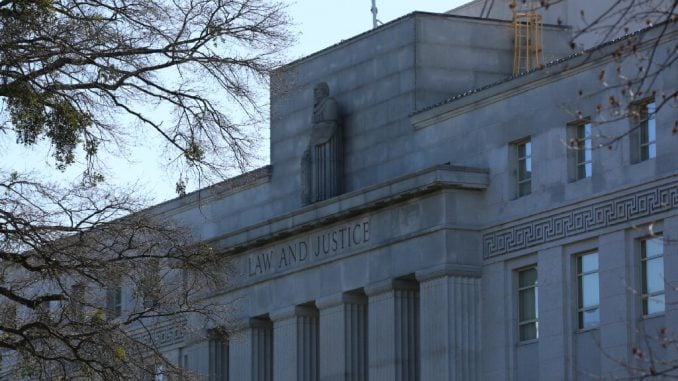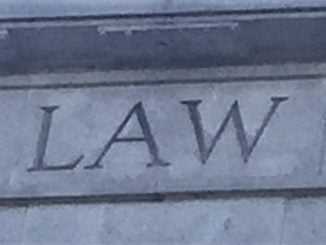
RALEIGH — Republican leaders of the N.C. General Assembly filed motions on Jan. 6 calling for two state Supreme Court justices, Sam Ervin IV and Anita Earls, to recuse themselves from the court case deciding whether the redistricting maps created by the General Assembly can stand and be used in the 2022 elections. This motion came a day before two Republican justices announced they would not recuse themselves in a case over voter ID, after similar recusal demands from liberal groups.
In a series of press releases, from Jan. 7 through Jan. 18, Republican state House and Senate leaders made the case that Ervin and Earls have conflicts of interest that should disqualify them from hearing the redistricting case.
In regards to Ervin, Republican leaders argued that because he is the only one currently running for office out of the justices, he may be unable to set aside campaign considerations as he decides. Ervin is running for reelection to his state Supreme Court seat, while the other six justices still have time in their terms or are not running again.
“Justice Ervin participated in a decision that halts candidates from filing for office against him, moves his opponents’ primary election back two months, and authorizes a truncated filing period for any more opponents when, and only when, this Court enters its final order on the proceedings,” the motion for Ervin to recuse read. “Accordingly, Justice Ervin should follow the examples of other jurists and recuse himself from consideration of these matters.”
Their complaint concerning Earls, on the other hand, is that she is too closely connected to the plaintiffs in the case. Concerns centered around former Obama administration Attorney General Eric Holder’s organization, National Democratic Redistricting Committee, which focuses its work on fighting for favorable redistricting maps for Democrats, having been a major campaign contributor to Earls.
“Supreme Court Justice Anita Earls won her 2018 election with a $250,000 boost from Eric Holder’s National Democratic Redistricting Committee. Now she’s hearing a case brought before her by that same organization,” a Jan. 13 press release from Senate Redistricting and Elections Committee co-chair Warren Daniel (R-Burke) said. “Do the groups claiming to be defenders of democracy think it’s healthy for justices to hear cases brought by their largest campaign backers? Or are they hypocrites, pretending to support noble causes until it threatens their political agenda?”
Notably, the motion for Earls to recuse ends with, “Conclusion: Justice Earls should recuse herself from this case,” and the motion for Ervin to recuse ends with, “Conclusion: Justice Ervin should recuse himself from these cases.”
The fact that they asked the justices to recuse themselves, rather than having recusal forced on them by the Court, is an acknowledgment of a decision by the Court, announced only days earlier, on Dec. 23, 2021, by clerk of the N.C. Supreme Court Amy Funderburk.
Funderburk said that in the event of a motion for recusal in a case before the Court, “The Court shall assign the motion to the Justice who is the subject of the motion for their determination. That determination shall be final.” If the justice does not want to decide on it themselves, the alternative is that they ask the other members of the court to make the decision for them. Historically, recusal decisions at the state Supreme Court have been made by the justice themselves, so this decision largely continues this precedent.
This decision on how recusal will operate was determined in response to the NAACP of North Carolina’s motion that Republican Justices Phil Berger Jr and Tamara Barringer be removed from a case regarding photo ID, which has been delayed while the matter was worked out.
NAACP-NC argued Berger Jr couldn’t be impartial since his father, Senate Leader Phil Berger (R-Eden), is a key player in how the law in question was drafted and passed; and that Barringer couldn’t be impartial since she had been a state senator at the time the bill was passed, with Barringer personally voting for the measure, which approved placing a referendum on voter ID on the ballot.
After Funderburk’s announcement that recusal remains up to the justices themselves, both Berger Jr and Barringer announced on Jan. 7 that they would not be recusing themselves from the voter ID case.
Berger said that “More than 2.7 million North Carolinians, knowing or at least having information available to them concerning my father’s service in the Legislature, elected me to consider and resolve significant constitutional questions like the one here.”
In her announcement, Barringer said, “I am following a strong and firmly rooted tradition in reaching the conclusion not to recuse myself due to my prior legislative service.”
On the redistricting case, Earls and Ervin are expected to follow suit in not recusing themselves, which would mean the redistricting case and the photo ID case will both be heard from a court with a 4-3 Democratic balance. The Wake County Superior Court panel that ruled on Jan. 11 that the maps could proceed, however, had a 2-1 Republican balance yet still decided unanimously, evidence that party affiliation is not a definitive sign of how a judge will decide.



